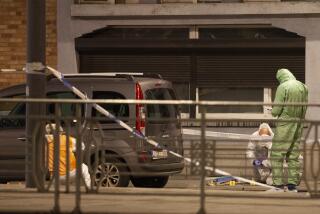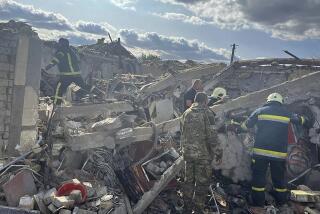Kosovo Peacekeepers in Divided City Come Under Attack, Kill Sniper
- Share via
PRISTINA, Yugoslavia — Ethnic Albanian snipers wounded two French peacekeepers in the strife-torn northern Kosovo city of Kosovska Mitrovica on Sunday, and French troops responded with gunfire that left one sniper dead and at least two snipers wounded, authorities said.
Nearly 20 people were reported injured in the day’s violence, which included a grenade attack on an ethnic Albanian home.
The snipers killed or captured Sunday were “all [ethnic] Albanian terrorists,” Lt. Col. Patrick Chanliau, a spokesman for the multinational peacekeeping force, known as KFOR, told reporters. Chanliau said five snipers had been wounded, but late Sunday evening another KFOR spokesman said he could confirm only that there were two wounded snipers in custody.
Kosovska Mitrovica--with a northern sector dominated by Serbs, a southern sector dominated by ethnic Albanians and both sides patrolled by international peacekeepers--has become the front line for conflicting visions of Kosovo’s future.
Most ethnic Albanians believe that Serbs want to partition Kosovo--a province of Serbia, Yugoslavia’s dominant republic--in Kosovska Mitrovica. Most Serbs believe that ethnic Albanians want to drive them away from the city, which abuts the main part of Serbia. International authorities want the two groups to live side by side in democracy and peace, a goal that appears increasingly elusive with every fresh wave of ethnic violence.
Sunday’s shootout, which raged for more than two hours, took place in several areas within the Serb-dominated part of the city. The motivation of the snipers was not immediately clear. One possibility is that they hoped Serbs would be blamed for the sniping. Another motive could have been ethnic Albanian anger at the alleged failure of French forces to protect the small ethnic Albanian minority that remains in the city’s northern part.
There were also reports of shootings between ethnic Albanian and Serbian gunmen in other areas within the city’s Serb-dominated sector, which lies north of the Ibar River. Heavy gunfire could be heard around noon coming from an ethnically mixed northern neighborhood. In the afternoon, two fires could be seen in the northern area.
Scattered gunfire was also heard Sunday in the ethnic Albanian-dominated southern part of the city. Snipers were also spotted in that section, Chanliau said.
U.N. Force Closes Bridges Over River
A group of armed ethnic Albanians tried to cross one of the bridges to the northern sector during the fighting but turned back when soldiers fired warning shots over their heads, Chanliau said.
KFOR further boosted its strength in the city Sunday and temporarily closed the two bridges over the Ibar, authorities said. Rules of engagement for KFOR troops have been changed to authorize soldiers to fire at anyone carrying weapons, Chanliau said.
“The situation has taken on a new complexion,” he said.
The city has also been placed under a 6 p.m. to 6 a.m. curfew, which will extend at least for a week, KFOR said.
Earlier Sunday, seven ethnic Albanians were wounded, two seriously, in a grenade attack on a house in the northern part of the city, authorities said.
There were also reports that several Serbs were injured in Sunday’s violence. Yugoslavia’s official Tanjug news agency said four Serbs were wounded. It quoted a Serbian doctor in the city as saying the wounds were serious but not life-threatening.
After a series of violent incidents early this month--including a Feb. 3 grenade attack on a Serbian cafe in northern Kosovska Mitrovica that injured 15, and attacks that same night by Serbs on ethnic Albanians, which left eight dead--international authorities in Kosovo ordered stepped-up patrols in the troubled city.
Additional British, German, Italian and Danish troops have been sent to supplement the French soldiers who are primarily responsible for maintaining order in this section of Kosovo, KFOR said. The United Nations police presence is also being strengthened, according to U.N. mission chief Bernard Kouchner.
KFOR tanks and armored personnel carriers were heavily deployed in the city Sunday, especially near the main bridge, and some drove north into the Serb-dominated sector.
Sunday’s violence began with an explosion, apparently of a grenade, near one of the bridges over the Ibar. About 30 minutes later, snipers hit the two French peacekeepers near the same bridge, according to a statement from KFOR. After another half an hour, one of the snipers was killed.
“A sniper was fatally wounded around 12:30 [p.m.] by French soldiers,” said Maj. Philip Anido, a KFOR spokesman. The sniper died after being taken to a KFOR hospital in Kosovska Mitrovica, authorities said. The wounds of the injured snipers were not life-threatening, Anido said.
Nikola Kabasic, a member of the local branch of the Serb National Council, the main Kosovo Serb organization, claimed that ethnic Albanian gunmen had kicked Serbian residents out of apartments in two residential towers north of the Ibar, then started sniping.
Both French soldiers underwent surgery but were out of danger, Chanliau said. One was hit in the stomach and the other in the arm, he said.
Order was restored in the city by midafternoon, Anido said.
Stanimir Vukicevic, chairman of a Yugoslav committee responsible for relations with the U.N. administration running Kosovo, was quoted by Tanjug as blaming KFOR for the violence.
“Full responsibility for the bloodshed in Kosovska Mitrovica rests with the leadership of the peacekeeping forces,” Vukicevic said. He said KFOR has behaved in a “conciliatory way” toward ethnic Albanians who are “trying to gain independence for Kosovo through bloodshed and ethnic cleansing in the very presence of the peacekeepers.”
Saturday night, French and Danish soldiers had made one of the more aggressive attempts so far to crack down on Serbian gunmen in northern Kosovska Mitrovica, raiding the Dolce Vita bar, a hangout for young Serbian men who have pledged to “defend” the northern part of the city from what many Serbs view as ethnic Albanian terrorism. Troops closed the bar and searched it for weapons but did not find any, KFOR said.
Ethnic Albanians Allege Bias by Troops
French troops have been fiercely criticized by ethnic Albanians for allegedly failing to crack down on Serbian gunmen in northern Kosovska Mitrovica and for being unable to protect ethnic Albanians from being forced out of their apartments there.
More than 900 ethnic Albanians have registered with authorities after fleeing northern Kosovska Mitrovica since the killings on Feb. 3, and others are believed to have fled but not registered, according to the Office of the U.N. High Commissioner for Refugees. That is out of about 2,500 ethnic Albanians who remained in the northern part of the city at the beginning of this month, according to the agency’s estimates.
More to Read
Sign up for Essential California
The most important California stories and recommendations in your inbox every morning.
You may occasionally receive promotional content from the Los Angeles Times.













